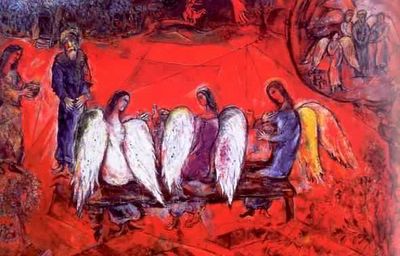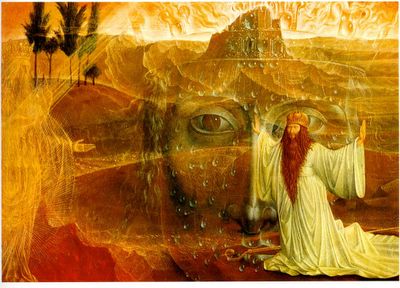There is a way. The way is discernable. Leaving the way has consequences. Keeping the way also has consequences.
DIDYMUS DICTA
DAILY MEDITATIONS ON THE PSALMS
About Me

- Name: Didymus
Each morning I spend 30 minutes, more or less, researching and writing on a passage of scripture. This is principally a form of spiritual self-discipline. But comments and questions are welcome.
Friday, September 30, 2005
There is a way. The way is discernable. Leaving the way has consequences. Keeping the way also has consequences.
Thursday, September 29, 2005
Today many churches recognize the feast day of Michael and all the Angels. In the scriptures and tradition angels are given various tasks. But the most common and constant is the singing of praise. The closer we attend to the source of creation, the more we are compelled to awe, thanksgiving, and praise.
To learn more about Michaelmas please visit the Satucket Lectionary.
Wednesday, September 28, 2005
The psalms are full of enemies. The psalmists, beginning with King David, were powerful or close to the powerful. While power and paranoia tend to travel together, the threats may have been entirely real. Power attracts or, perhaps, creates enemies.
I began reading the psalms each morning two or three years ago. Part of my attraction is the fear, weakness and uncertainty of the psalmists. One hundred generations ago - and more - people of faith were often as weak and afraid - or worse - as me.
The psalms were written to be sung outloud. Seems like decent therapy to unburden ourselves from our greatest fears by singing them outloud for all to hear.
Tuesday, September 27, 2005
Any direct encounter between God and myself will feature significant divine restraint. Even then my response is likely to be fearful. And in fear, I will probably not hear clearly or understand fully.
When God uses intermediaries - prophets, teachers, the holy spirit - I can hear better, but it is also easier to doubt, to argue, or just ignore.
I have eaten from the tree of the knowledge of good and evil. I have exchanged innocent wisdom for knowledgable confusion. I am in desperate need of patience, forgiveness and love; all of which are offered if I will set aside my confusion just long enough to accept.
Monday, September 26, 2005
Psalm 89 begins with a celebration of God's blessing. The second half concludes, "Lord, where is your steadfast love of old?" When life is good we are sure God loves us. When troubles come we may perceive God's love has been withdrawn.
It is more likely that God's love is constant. Conditions change not because God's attitude varies, but because we make choices that are inconsistent with the paths of truth. God is righteous (tsedaq) which is true, consistent, and whole. Because we lack wise judgment (mishpat) we will make choices that are inconsistent with God's righteousness. There are consequences of such choices.
In my own experience, it is precisely when I have made a bad choice and am suffering the consequences, that I have found God's love to be strongest. I perceive that these times of undeniable need may be the only time I am sufficiently open to truly receive the love of God.
God is constant. We are not.
Sunday, September 25, 2005
Shame has lost much of its power in American culture. It is almost as if the public response that once brought shame now delivers celebrity.
In the psalms shame is greatly feared. There are many different forms of shame: humiliation, depression, dishonor, and more. The word used in the 25th Psalm is buwsh which can also mean confused or confounded. The sense of public embarrassment is much weaker in this word than in other forms of shame that might have been used. Rather, it seems to refer to private uncertainty.
The psalmist is asking to be shown the destination of God's truth. By seeing where truth is on the map of life confusion can be avoided, impediments passed by, and the paths of "love and faithfulness" followed.
Saturday, September 24, 2005
God's love is unconditional. But this love does not protect us from the consequences of our own choice. Achieving a positive outcome requires that we make choices consistent with God's purposes.
If we accurately perceive the purpose of God's work, choose to contribute to that work, and are effective in our contributions, then our work will prosper. If we make other choices God will still love us. But without observing the necessary preconditions, our choices will not prosper.
Friday, September 23, 2005
We often fail to see that our own free choice has resulted in an unintended consequence. Instead of our own errors, we perceive betrayal, conspiracy, and even persecution. The psalmists often claim that God has foresaken them. Yet soon, the same psalmist is praising the everlasting love of God.
I can push away those whom I love and love me. In my fears and preoccupations I can isolate myself and then feel neglected. A loving question or concerned comment can be heard as an attack. I am adept at self-defeating behavior.
We are needy. It is good to admit our need. It is helpful to reach out, even if like the psalmist we do so with an unjust complaint. In sharing our vulnerability we open ourselves to the healing power of love.
Thursday, September 22, 2005
We experience disappointment, loss, and pain. We are brought low. But if we are simple (more literally "open") our relationship with God can transform suffering into insight. Another translation could read, "I was brought low and liberated."
Wednesday, September 21, 2005
First we ask to know God's rules or choq. What does God prescribe for our lives?
Then we seek consideration and insight, the Hebrew is biyn. Without insight we may misunderstand the rules.
Third we undertake to walk, to actually go and do as the rules and insight lead us. The Hebrew is darak which can also mean to march.
Finally we pray that we may find ourselves by losing ourselves in the way of God.
Tuesday, September 20, 2005
God is compassionate. God is rachuwm in the original Hebrew. God loves deeply, fully, and empathetically. God loves us because God understands us much better than we understand ourselves.
God calls us to love one another as we are loved. We give ourselves the benefit of the doubt. God gives us the benefit of full understanding. We are asked to love others at least as well as we love ourselves. Even better is to love as God loves.
If we would accept this love, how might it change our life? If we allowed ourselves to be so completely loved, how might we love others? If we were able to love others as fully as we are loved, how might the world be changed?
Saturday, September 17, 2005
I will extol you, my God and King, and bless your name forever and ever. Every day I will bless you, and praise your name forever and ever. Great is the Lord, and greatly to be praised; his greatness is unsearchable. (Psalm 145: 1-3)
We are called to praise not for the sake of God, but for our own sake. Too often we are preoccupied by worry regarding the future. Too often we are in mourning for that which is past. Too seldom do we recognize the blessing of the here and now.
God is the ground of being, foundation of reality, and source of life. In praising God we may recall and claim the beauty and goodness that is present in the worst of times. In better times we may find the utter joy of living.




